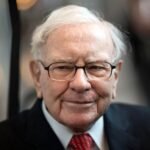Warren Buffett, widely regarded as the most successful investor of the 20th and 21st centuries, has left an indelible mark on the world of finance as the chairman and CEO of Berkshire Hathaway. Known as the “Oracle of Omaha,” Buffett’s disciplined approach to value investing, coupled with his extraordinary business acumen, has transformed a struggling textile company into a $1.16 trillion conglomerate. This article explores Warren Buffett’s background, his rise to prominence, and the principles that have defined his remarkable career, offering insights into why he remains a guiding light for investors worldwide.
Early Life and Background of Warren Buffett
Born on August 30, 1930, in Omaha, Nebraska, Warren Edward Buffett was the second of three children and the only son of Leila Stahl and Howard Buffett, a stockbroker and four-term U.S. congressman. Growing up in a family with a strong business ethos, Buffett displayed an early aptitude for entrepreneurship. At age seven, he borrowed One Thousand Ways to Make $1000 from the Omaha public library, sparking his lifelong passion for business and investing. By 11, he purchased his first stock—three shares of Cities Service Preferred—and at 14, he invested $1,200 of his savings in a 40-acre farm, showcasing his precocious financial instincts.
Buffett’s education began at Rose Hill Elementary School in Omaha, followed by Alice Deal Junior High and Woodrow Wilson High School in Washington, D.C., after his father’s election to Congress in 1942. Despite his desire to dive straight into business, Buffett enrolled at the Wharton School of the University of Pennsylvania in 1947 at his father’s insistence. After two years, he transferred to the University of Nebraska-Lincoln, earning a Bachelor of Science in Business Administration in 1950. He later pursued a Master’s in Economics at Columbia Business School, where he studied under Benjamin Graham, the father of value investing. Graham’s philosophy of buying undervalued companies with strong fundamentals became the cornerstone of Buffett’s investment strategy.
Warren Buffett’s Rise at Berkshire Hathaway
Buffett’s career began in the early 1950s as an investment salesperson, followed by the formation of Buffett Associates in 1956. In 1965, he took control of Berkshire Hathaway, a failing textile manufacturer, and transformed it into a holding company for his investments. Over six decades, Buffett, alongside his late business partner Charlie Munger, grew Berkshire into a conglomerate with over 65 wholly owned companies, including GEICO, Dairy Queen, and Duracell, and significant stakes in firms like Apple, Coca-Cola, and American Express. As of May 2025, Berkshire’s market capitalization exceeded $1.16 trillion, and Buffett’s personal net worth was estimated at $160.2 billion, making him the fifth-richest individual globally, according to Forbes.
Buffett’s business acumen is rooted in his disciplined adherence to value investing. He seeks companies with strong economic moats—competitive advantages that protect long-term profitability—and purchases them at prices below their intrinsic value. His 1972 acquisition of See’s Candies, guided by Munger’s advice to prioritize quality businesses over cheap ones, marked a pivotal shift in his strategy. Buffett’s long-term approach is encapsulated in his famous advice: “If you aren’t willing to own a stock for 10 years, don’t even think about owning it for 10 minutes.” His investments in Apple and Coca-Cola, which have appreciated significantly over decades, exemplify this philosophy.
Business Acumen and Leadership Principles
Warren Buffett’s success stems from a unique combination of analytical rigor, industry insight, and leadership acumen. Bruce Greenwald, Professor Emeritus at Columbia Business School, highlights Buffett’s “exceptional and unusually disciplined analysis of financial reports,” mastery of industry dynamics, and ability to assess management capabilities. Buffett empowers managers with autonomy, fostering a decentralized structure at Berkshire that prioritizes long-term growth over short-term gains. His annual shareholder letters, renowned for their clarity and wit, offer insights into his investment philosophy and have been described as “the investment world’s equivalent of a Harry Potter book release.”
Buffett’s ability to navigate economic challenges, such as the 2007–08 financial crisis, underscores his strategic foresight. His $5 billion investment in Goldman Sachs and $3 billion in General Electric during the crisis, though initially questioned, proved highly profitable. However, Buffett has faced criticism, notably for Berkshire’s underperformance against the S&P 500 in recent years and controversies like the 1974 Wesco Financial acquisition, which led to a $115,000 SEC settlement. Despite these, his reputation remains largely intact, bolstered by his frugal lifestyle—living in the same Omaha home he bought for $31,500 in 1958.
Recent Developments and Legacy
In May 2025, Buffett announced his retirement as CEO of Berkshire Hathaway, effective at the end of 2025, naming Greg Abel as his successor. The announcement, made at Berkshire’s annual shareholder meeting—often called the “Woodstock for Capitalists”—drew tributes from business leaders like Apple CEO Tim Cook, who called Buffett “one of the greatest CEOs ever,” and Bill Gates, who praised his integrity and philanthropy. Buffett, now 94, plans to remain active, stating to The Wall Street Journal, “I’m not going to sit at home and watch soap operas… My interests are still the same.” His recent moves, including selling significant Apple stock and holding a large cash reserve, reflect his cautious approach amid high market valuations, as noted in posts on X.
Buffett’s philanthropy, through the Giving Pledge co-founded with Bill Gates in 2010, commits him to donate over 99% of his wealth, with $62 billion already given, primarily to the Bill & Melinda Gates Foundation. His modest lifestyle, including his $3.17 McDonald’s breakfasts and bridge games with Gates, contrasts with his immense wealth, earning him the moniker “the nicest billionaire.”
Warren Buffett’s legacy as a disciplined investor, principled leader, and generous philanthropist continues to inspire. His value investing philosophy, long-term vision, and commitment to societal good ensure his influence will endure beyond his tenure at Berkshire Hathaway.
References
- Wikipedia. (2025). Warren Buffett.
- Forbes. (2025). Warren Buffett.
- Columbia Business School. (2025). Buffett’s Departure.
- Investopedia. (2025). Warren Buffett’s Investment Strategy.
- CNN Business. (2025). Warren Buffett Reveals Retirement Plans.
- Business Insider. (2025). Reactions to Buffett’s Retirement.
Victoria Reaves
I'm Victoria Reaves, a dynamic writer and researcher deeply passionate about exploring the realms of technology innovations, environmental sustainability, and educational advancements. With my background in environmental science and a love for storytelling, I delve into captivating narratives that connect the dots between the past, present, and our vision for a sustainable future. Through my writing, I aim to inspire readers to adopt sustainable living practices while delving into the fascinating intersections of technology, history, and education. Join me on this journey of discovery and empowerment as we navigate the ever-evolving landscape of innovation and sustainability.

